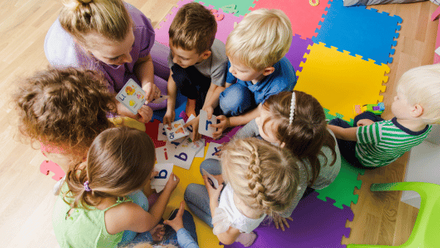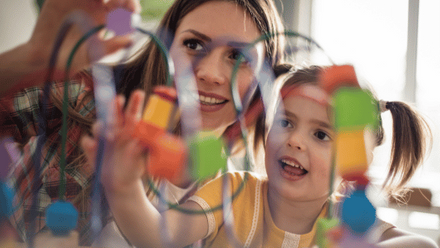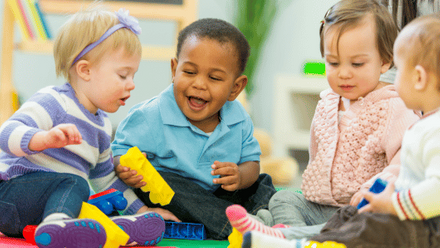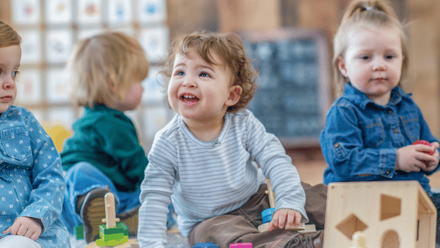Speak, sign, shine: celebrating International Makaton Day
28 August celebrates International Makaton Day, a day which recognises and celebrates the value that Makaton brings to the community. It aims to raise awareness of Makaton as a language programme that enhances and supports communication.
Makaton is used widely across many areas, including healthcare and education, with all ages. In early education and care, Makaton is a universal provision, designed to support every child’s communication and language development. For some children, such as those with additional communication needs or learning English as an additional language, Makaton can provide an essential mechanism for expression and communication with others.
In recognition of International Makaton Day, this article takes a look at some of the benefits of using Makaton with children in early education and care and highlights some useful resources to get you started in your own Makaton journey!
What is Makaton?
When we think about signing, we often think of British Sign Language (BSL), a formal language that uses a combination of hand gestures, shoulder movements, and facial expressions to communicate. Officially recognised as a language in its own right in 2022, BSL is the most common form of sign language in the UK.
But with over 1 million users of its own, Makaton is a language programme that utilises signs and gestures to aid communication using keywords and phrases. Unlike British Sign Language, it does not have a grammar structure and is not considered a language of its own, but it aims to support spoken language and meaning using signs and symbols combined. A few key points about Makaton:
- It does not replace spoken language. It is always used in conjunction with spoken words and is signed in the same order as speech.
- As well as signs using hands, Makaton also includes simple line symbols to provide a permanent representation of language too.
- It is increasingly being used with all children to support speech and language development, but it has been showed to particularly support children with additional communication needs.
Using Makaton to promote inclusive education with everyone
Makaton provides an accessible form of communication for all children as a universal provision that can be easily implemented into the everyday. When used consistently with all children, Makaton fosters an inclusive environment where everyone can use the same communication tools, including staff and families too.
Whilst the majority of research focuses on the use of Makaton with children with additional communication needs, it is also shown to aid language development and reinforce understanding with all children, regardless of their ability. Using Makaton with babies, for example, can support the advancement of single words and attributing meaning to language.
Providing an avenue of communication that supports emotional and social wellbeing
For children who are unable to express their needs and articulate their feelings, it can be an extremely frustrating experience to constantly have to navigate communication barriers in their daily lives. Makaton offers alternative ways to communicate, through keyword signing or identifying pictorial symbols, which can reduce feelings of overwhelm and distress stemming from feeling misunderstood and unheard.
Not only does Makaton provide a way to allow children to accurately label their feelings but also gives them the autonomy to express desires and self-identify ways to support themselves. This recognition of feelings and finding ways to support ourselves, knowing the individual ways we regulate our emotions, is a big part of self-regulation in the early years.
Promoting partnership with families
The key to Makaton is consistency so it’s important to make sure everyone is utilising signs and symbols within the communication to allow children to express themselves and feel part of every conversation. Makaton resources can be easily shared with families to support their understanding of the effectiveness of Makaton and put it into practice at home too.
Cognitive development and memory retention
Makaton signs and symbols are not only a useful resource for communication in the moment but can aid in wider vocabulary and understanding. Attributing signs and symbols to keywords engages children’s memory and cognitive processing in multiple ways, which can enhance overall cognitive development.
As children learn to use signs and symbols to communicate, it also develops a variety of problem-solving skills that are implemented when thinking about how to express their thoughts in different ways.
Developing social skills
When all children in a setting are familiar with Makaton, it encourages social interactions with others as they can communicate and understand each other better, regardless of their wider communication needs.
Using Makaton can help children develop empathy and understanding towards others who have communication needs, fostering a more inclusive and supportive community from the earliest years. All children may show greater confidence when they can successfully express themselves using Makaton, leading to greater participation and engagement in activities, leading to more fruitful learning opportunities across the curriculum.
Helpful resources for implementing Makaton
Engaging parents and carers
Using Makaton with your child – Something Special, Cbeebies
Sign of the week – The Makaton Charity*
Using Makaton in your setting
Basic Makaton guide – TES
Really useful Makaton signs – Something Special, Cbeebies
Free resources – The Makaton Charity*
The Makaton Charity Channel - YouTube
Research behind Makaton
Library of research papers – The Makaton Charity*
A brief history of Makaton – YouTube
*Please note you will need to register for a free account with The Makaton Charity in order to access these resources.
Makaton is truly something special. Developed to support language development, vocabulary growth and communication needs, Makaton is used widely across the UK and has been developed for use around the world! Explore the suggested resources and think about how you can implement more Makaton in your work today.





